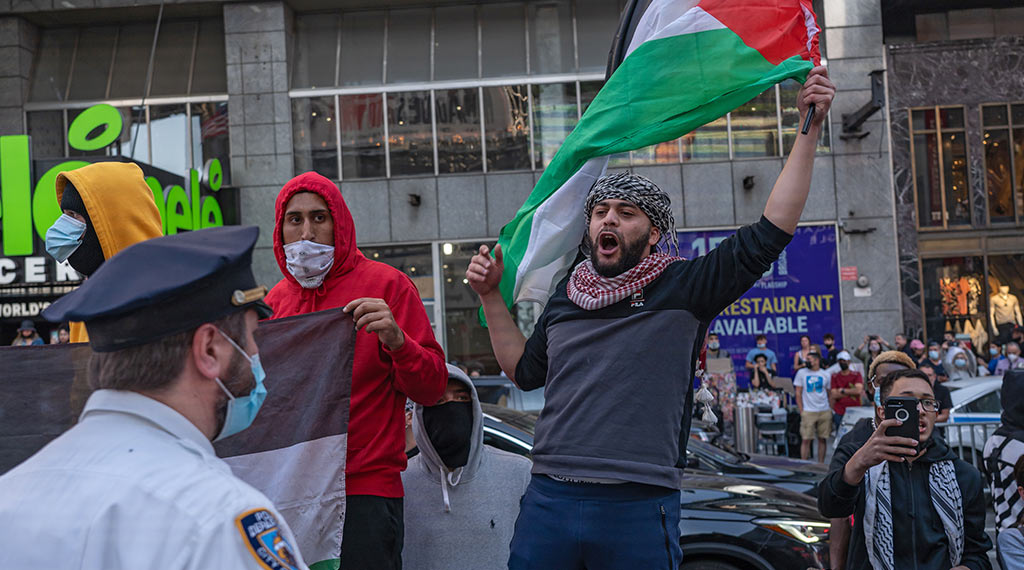The Palestinian uprising on American streets is about more than social media

In Los Angeles, a Palestinian gang assaulted Jews outside a Sushi restaurant. Rioters asked whether victims are Jewish before assaulting them. Other video showed Arab men outside a restaurant spitting on Jewish diners. Pickup trucks filled with Palestinian flag-waving men dismounted and brutalized those who make any sign of disapproving of their militant protest. In one video a hand-held explosive (likely a commercial-grade firework) is thrown into a crowd.
Such scenes have become all too common across the world but have now come to America. Video out of Los Angeles and New York featuring these scenes are replete on social media.
Given how closely this violent behavior mimics that of the Antifa/BLM violence perpetrated over the course of 2020, it is easy to presume that this is somehow a new phenomenon. It is popular to assert that this violence developed out of recent innovations such as the deployment on social media campaigns featuring influencers. A recent Fox News article blamed, “Facebook, Instagram, Twitter and TikTok.”
The article goes on to cite a researcher who warns that while social media apps, “‘warm’ users to certain forms of extremism, encrypted apps like Facebook-owned WhatsApp and Telegram, as well as private Facebook groups, are where ‘incitement happens.’”
Is social media really the most relevant factor in the incitement of pro-Palestinian violence in the United States? Would it not be reasonable to place more blame on the organizations with ties to Palestinian terrorist organizations operating on nearly every college campus for decades?
The Muslim Students Association (MSA) has been active in the United States since the early 1960s, when it was founded by leading intellectual members of the Muslim Brotherhood. They have graduated thousands of Islamist activists, including dozens of convicted terrorists.
The even more radical Students for Justice in Palestine (SJP) was formed in 1992 and centralized into a nationwide organization in 2010 by the Hamas-linked American Muslims for Palestine (AMP). SJP cooperates closely with Boycott, Divestment, and sanctions groups tied to PFLP and other Palestinian terror groups.
Generations of activists from organizations like these have been raised on a steady diet of hate and make up the cadres which run lobbying organizations, legal groups, fundraising organizations, public relations firms, and “civil rights” non-profits (such as Hamas-linked CAIR). They are the ones who help get members of “The Squad” elected and provide them with antisemitic talking points.
Analysis which blames social media for the advent of “extremism” is a symptom of the laziness of researchers and self-identified experts. The reality is that social media has simply made visible the results of the long running process of recruitment, indoctrination, training and deployment. We see now on a daily basis the vitriolic hatred which was once only visible to a handful of brave researchers who were willing to perform the necessary investigative journalism to uncover what was being said in mosques, classrooms, convention halls, and circulated on grainy videotapes.
The solution to pro-Palestinian violence (or other extremist violence for that matter) won’t be found by limiting speech on the internet. It can only come through the identification and disruption of subversive and terror-aligned groups which operate in the real world and are engaged in the daily work of promoting an antisemitic and pro-terror ideology. This will involve research and investigation, public relations, education, as well as conducting lawfare building both civil and, when appropriate, criminal cases. The only way to defeat such networks is by building networks of our own.
- Anarchists call for solidifying gains, expanding violent insurgency - February 5, 2026
- Shideler: Resistance to Immigration Enforcement Is Fierce in Minnesota - February 2, 2026
- The Revolution Is On in Minnesota - January 26, 2026
